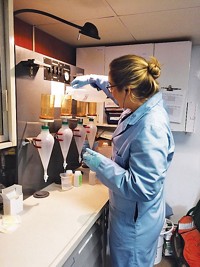Advertisement
Grab your lab coat. Let's get started
Welcome!
Welcome!
Create an account below to get 6 C&EN articles per month, receive newsletters and more - all free.
It seems this is your first time logging in online. Please enter the following information to continue.
As an ACS member you automatically get access to this site. All we need is few more details to create your reading experience.
Not you? Sign in with a different account.
Not you? Sign in with a different account.
ERROR 1
ERROR 1
ERROR 2
ERROR 2
ERROR 2
ERROR 2
ERROR 2
Password and Confirm password must match.
If you have an ACS member number, please enter it here so we can link this account to your membership. (optional)
ERROR 2
ACS values your privacy. By submitting your information, you are gaining access to C&EN and subscribing to our weekly newsletter. We use the information you provide to make your reading experience better, and we will never sell your data to third party members.
Policy
Professors Fault Research Review Process
by Britt E. Erickson
September 10, 2012
| A version of this story appeared in
Volume 90, Issue 37
Institutional review boards (IRBs), which decide whether research that involves human subjects can be conducted, are threatening academic freedom, according to a report released last week by the American Association of University Professors (AAUP). The report suggests that university departments, faculty committees, and researchers themselves could handle many of the responsibilities currently assigned to IRBs. AAUP claims that IRBs are often made up of members who don’t have specific qualifications to evaluate research projects in a wide range of disciplines. The group also states that IRBs consider limited information when evaluating research proposals and place significant demands on researchers. The report is the third from AAUP that focuses on the tension between preservation of academic freedom and the use of IRBs to protect human subjects in research. AAUP released the report to urge the Department of Health & Human Services to overhaul regulations related to the IRB review process. Last year, HHS asked the public for input about the review process, but it has yet to propose a rule.




Join the conversation
Contact the reporter
Submit a Letter to the Editor for publication
Engage with us on Twitter